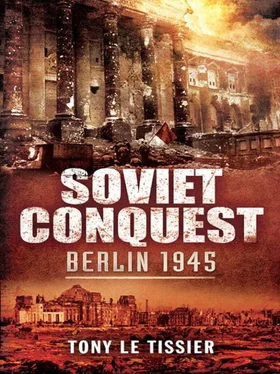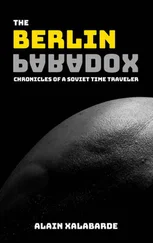The Berlin garrison consisted of troops loyal to Hitler. In order to maintain the establishment of the Fascist Reich for as long as possible, the Fascist leaders in the city concentrated various security battalions and SS units, as well as members of military training establishments. Apart from this, the enemy also still counted on getting help from the outside, everything that gave him the strength to continue resisting.
For the whole day until night fell artillery and tank fire thundered in the streets around the railway stations of Savignyplatz and Charlottenburg. Every metre of ground was fired on by the troops. The fate of the Berlin garrison was nevertheless already decided, our troops having formed a firm ring around the city. Nevertheless the Fascists did not give up their resistance but even conducted counterattacks in individual sectors, completely indifferent to the number of victims.
Not until night time did the exhausted and demoralised Fascists take a breath and we could eliminate the confusion in our ranks. In my sector could be found tanks from General Bogdanov’s 2nd Guards Tank Army and members of the 55th Guards Rifle Division of General Lutschinski’s 28th Army. Our tanks had found themselves in the 1st Byelorussian Front’s area and we had to look everywhere for our submachine-gunners. Only the artillery brigades and the corps units attached as reinforcements were still in our area, Lieutenant-Colonel Schalunov keeping a firm grip on them.
All night long staff officers, political advisers and rear area services sought our units. Towards morning we had everyone brought together and had them occupy positions between the Reichssportfeld S-Bahn station and the Reichsstrasse. Here we were able to refuel the vehicles and tanks and resupply them with ammunition, and the troops found time to eat and drink.
Schalunov and Sassimenko were happy as cable communications had been established with the staff, entailing less anger with the radios. Apart from this we could maintain personal contact with General Novikov.
No one had thought that the last day of April should be the hardest. On the contrary, we thought that the fighting would die down. The evening before we had given the Fascists a good drubbing and during the night our scouts had located no big enemy groupings.
The day was warm and sunny. In our sector there were a few exchanges of fire, seldom artillery fire, and the tanks were silent. But in the city centre and in the Unter den Linden–Tiergarten–Reichstag area bitter fighting was still going on. There was even heavy artillery in action. Our air forces ruled the air. We could also hear artillery fire coming from the direction of Wannsee and Potsdam. Anti-aircraft gunfire bellowed on the southern and northern edges of the city, and tank guns thundered. Only in our corps was it relatively quiet.
The silence did not last for long, however. Towards midday scouts reported enemy forces in the Spandauer Damm–Westend area. By radio Serashimov reported a large grouping in Bismarckstrasse. We therefore had to reckon on a counterattack at any moment.
During the second half of the day the enemy moved in individual units, small groups or columns towards Witzleben–Heerstrasse–Reichssportfeld, opening unorganised fire with all kinds of weapons. Rockets soared into the sky. A column came loudly near us, led by SS officers. It was accompanied by several tanks and self-propelled guns. Twenty years later I discovered from archive material that it involved SS units, members of the Hitler Youth and ‘Totenkopf’ units that wanted to break through to the west and surrender to our allies.
Our artillery battalion fired concentrated fire. That was also the signal for the others. Shortly afterwards all of our artillery joined in. The mortar batteries that had taken up firing positions in the Olympic Stadium were equally active, the tank troops and submachine-gunners also joining in the fight. I watched from the roof of a two-storey house. Hundreds of dead and wounded lay in the streets. Our fire barred the Fascists’ route to the Havel lakes, but they did not give up. The fighting went on until late in the evening, by which time we had finally succeeded. On this day both the 56th Guards Tank Brigade and the 23rd Guards Motor Rifle Brigade, as well as the whole of the 7th Guards Tank Corps and elements of the 28th Army’s 55th Guards Rifle Division had been involved.
That evening I discussed the events of the day with my deputies and staff officers and simultaneously prepared the next tasks with them.
‘The Germans are going back along Bismarckstrasse towards northern Charlottenburg,’ reported Schalunov tiredly.
‘They should retreat quietly. They’ll not get far, General Bogdanov’s people will get them.’
The head of the medical services, Boguslavski, came up to me.
‘Where shall we take the wounded?’
‘To the medical battalion, to the hospital. Don’t you know where you must take them?’
‘You have not understood me correctly, Comrade Colonel. I am talking about the Germans. Hundreds of German wounded need medical help.’
I looked at Boguslavski, at his face grey with fatigue, his red eyes. During the war I had become accustomed not to wonder about it any more, but the medics impressed me again and again. Many had lost their relatives in this war, constantly seeing human pain, seeing the crimes of the Fascists, everything that would really leave people hardened. But this was not so as one saw time and time again. Our soldiers went mercilessly against the armed enemy, but were charitable towards civilians, prisoners and the wounded. This was not so only in the days of our victorious thrust to the west, but also in the difficult time when we had had to withdraw.
This was also the reason why Boguslavski’s question surprised me. I was strongly convinced that he had long since given his instructions and that the question was merely a formality to inform me. On the 26th April a field hospital on the western edge of the city had fallen into our hands. Some three hundred badly wounded German officers were lying in a large school building. Until then they had seen no Soviet soldiers. Boguslavski now wanted to accommodate more wounded there.
Shortly after he had left me, several German doctors appeared before me. Excitably, a female doctor made it clear to me that she feared for her patients.
‘You have no need to worry,’ Dmitriev answered her. ‘We are Soviet men, Communists, do you understand? We will look after the captured humanely and especially the wounded.’
That night all the wounded Germans in our sector we collected and accommodated in a hospital. When Boguslavski discovered that there was neither water nor electricity in the building and that the food supplies were almost exhausted, we immediately put a hundred loaves of bread, sugar and conserves from our supplies at their disposal.
During the night of the 1st May the fighting died down, although we were prepared for any surprise. As the corps headquarters was silent, I decided to call the corps commander. General Novikov did not lift the receiver for a long time, but then said his name. After I had greeted him I asked him: ‘Comrade General, I urgently need riflemen. Our tanks are burning, the officer numbers are melting away. Please help us, at least with a battalion.’
The general was silent. After a few minutes I timidly asked him whether he had heard me.
‘Yes, I heard you well,’ answered Novikov. ‘But I cannot help you. I have no riflemen.’ Again there was silence. I heard the general breathing heavily. Suddenly he said: ‘David Abramovitch, I have a big concern. My Jura fell in Berlin yesterday. He had led a self-propelled-gun regiment in action and…’ the voice of the general trembled. ‘Jura is lying here beside me.’
Читать дальше












